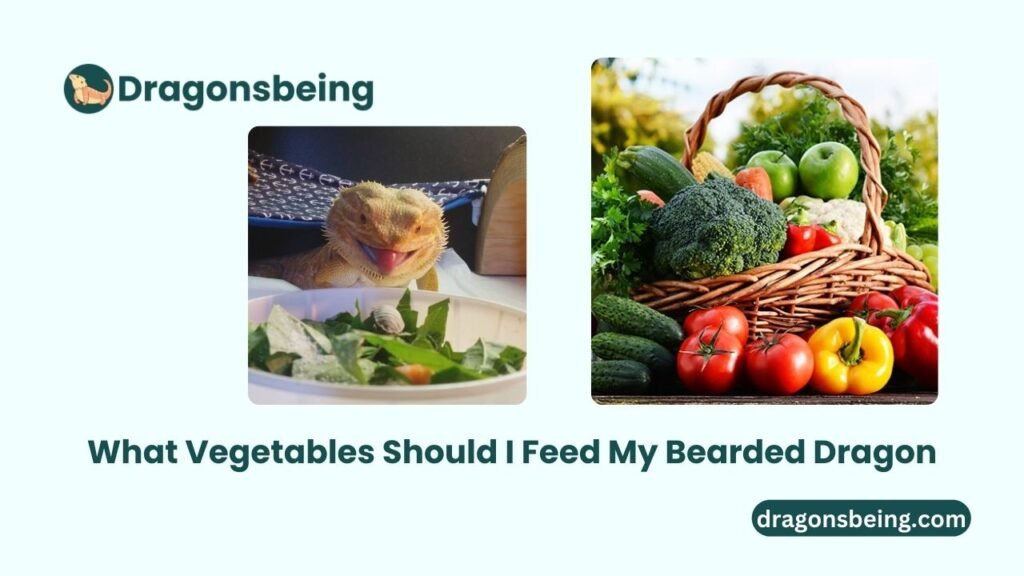Feed your bearded dragon leafy greens like collard greens, dandelion greens, and mustard greens. Offer bell peppers, squash, and carrots in moderation for variety.
Bearded dragons thrive on a balanced diet that includes a variety of vegetables. These reptiles require specific nutrients for optimal health and growth. Leafy greens should form the base of their diet, providing essential vitamins and minerals. Brightly colored vegetables add necessary fiber and antioxidants, enhancing their overall well-being.
Understanding what vegetables to include helps prevent nutritional deficiencies. It’s crucial to wash all vegetables thoroughly and chop them into manageable pieces for easier consumption. Introducing a mix of textures and colors keeps mealtime interesting for your pet. Proper vegetable selection contributes significantly to your bearded dragon’s happiness and longevity.
Introduction To Bearded Dragon Nutrition
Feeding your bearded dragon the right vegetables is crucial. Proper nutrition helps them grow strong and healthy. Understanding their dietary needs ensures they thrive.
The Importance Of A Balanced Diet
A balanced diet provides essential nutrients. Bearded dragons require a mix of:
- Vegetables
- Fruits
- Insects
- Supplements
Each food group plays a vital role. Vegetables provide fiber and vitamins. They help with digestion and overall health. A poor diet can lead to health issues.
Understanding Your Dragon’s Dietary Needs
Bearded dragons are omnivores. Their diet should include:
| Food Type | Recommended Percentage |
|---|---|
| Vegetables | 40-60% |
| Fruits | 10-20% |
| Insects | 20-40% |
Focus on leafy greens and colorful vegetables. Some great options include:
- Collard greens
- Mustard greens
- Kale
- Squash
- Bell peppers
Always chop vegetables into small pieces. This prevents choking and makes eating easier. Avoid toxic plants. Research all foods before offering them.
Safe Vegetables For Your Bearded Dragon
Choosing the right vegetables is crucial for your bearded dragon’s health. Certain vegetables are safe and nutritious. They provide essential vitamins and minerals. Let’s explore which veggies are best for your scaly friend.
Leafy Greens To Include
Leafy greens should be a staple in your bearded dragon’s diet. They offer vital nutrients. Here are some great options:
- Collard greens – High in calcium and vitamins.
- Mustard greens – Rich in fiber and iron.
- Dandelion greens – Packed with calcium and antioxidants.
- Turnip greens – Great source of vitamins A and K.
- Swiss chard – Contains vitamins and minerals.
Chop these greens into small pieces for easy eating. Freshness matters. Always wash leafy greens before serving.
Vegetables To Feed In Moderation
Some vegetables should only be given occasionally. They may contain oxalates or other compounds. Here’s a list:
| Vegetable | Reason to Feed in Moderation |
|---|---|
| Spinach | High oxalate content can hinder calcium absorption. |
| Beet greens | Also high in oxalates. Limit intake. |
| Broccoli | Can cause gas. Feed sparingly. |
| Cauliflower | May disrupt digestion. Use in small amounts. |
Always observe your dragon after introducing new foods. Adjust based on their reactions. Keeping a balanced diet is key.
Vegetables To Avoid
Feeding your bearded dragon the right vegetables is crucial. Some vegetables can harm their health. Knowing which to avoid helps keep them safe and happy.
Harmful Vegetables
Here are some vegetables that can be harmful to your bearded dragon:
| Vegetable | Reason to Avoid |
|---|---|
| Spinach | High oxalate content can cause kidney problems. |
| Rhubarb | Contains toxic compounds that can be deadly. |
| Potato | Contains solanine, which is toxic to reptiles. |
| Onion | Can cause anemia and other health issues. |
| Garlic | Can lead to serious digestive issues. |
Why Some Vegetables Are Not Safe
Many vegetables are not safe for bearded dragons due to specific reasons:
- Oxalates: These can bind calcium, leading to deficiency.
- Toxins: Some vegetables contain harmful substances.
- High starch: Starchy vegetables can cause obesity.
- Digestive issues: Certain vegetables can upset their stomach.
Always research vegetables before feeding them. Your bearded dragon’s health is the priority.
Organic Vs Non-organic Vegetables
Feeding your bearded dragon the right vegetables is vital. Choosing between organic and non-organic options can be confusing. Both have their pros and cons. Understanding these differences helps you make better choices for your pet.
Benefits Of Organic Vegetables
Organic vegetables offer several advantages:
- No pesticides: Organic veggies are grown without harmful chemicals.
- Better nutrients: They often contain more vitamins and minerals.
- Safer for digestion: Organic options are easier for your dragon to digest.
- Environmentally friendly: Organic farming practices help the planet.
| Vegetable | Nutritional Value | Organic Benefits |
|---|---|---|
| Carrots | High in Vitamin A | Lower pesticide residue |
| Spinach | Rich in iron | More antioxidants |
| Bell Peppers | High in Vitamin C | Less chemical exposure |
Considerations For Non-organic Produce
Non-organic vegetables can still be suitable for your bearded dragon. Here are some points to consider:
- Pesticide residue: Non-organic veggies may contain chemicals.
- Cost: Non-organic options are often cheaper.
- Availability: They are easier to find in stores.
To reduce risks, wash non-organic vegetables thoroughly. Peeling can also help remove some residues. Always check for any signs of spoilage before feeding.
Preparing Vegetables For Your Bearded Dragon
Feeding your bearded dragon the right vegetables is essential. Properly preparing these veggies ensures they are safe and nutritious. Here are some important steps to follow.
Washing And Cutting
Cleanliness is vital for your bearded dragon’s health. Always wash vegetables thoroughly before feeding. Here’s how to do it:
- Rinse vegetables under cold water.
- Use a vegetable brush for firm veggies.
- Remove any wilted or damaged parts.
- Pat dry with a clean towel.
- Cut vegetables into small, manageable pieces.
Small pieces make it easier for your dragon to eat. Avoid large chunks that may cause choking.
Cooked Vs Raw Vegetables
Both cooked and raw vegetables have benefits. Here’s a quick comparison:
| Type | Benefits | Considerations |
|---|---|---|
| Raw Vegetables |
|
|
| Cooked Vegetables |
|
|
Choose a mix of both cooked and raw vegetables. This variety keeps meals interesting and nutritious.
Frequency And Quantity Of Vegetable Feeding
Understanding the right frequency and quantity of vegetables is crucial. Bearded dragons need a balanced diet for optimal health. Proper feeding helps prevent obesity and nutritional deficiencies.
How Often To Feed Vegetables
Vegetables should be offered daily. Young bearded dragons need more vegetables than adults. Here’s a simple schedule:
- Juveniles: Feed vegetables every day.
- Adults: Offer vegetables 4-5 times a week.
Always ensure the vegetables are fresh. Remove uneaten vegetables after a few hours to avoid spoilage.
How Much To Feed At A Time
The quantity of vegetables varies by age. Here’s a guideline:
| Age Group | Serving Size |
|---|---|
| Juveniles (0-6 months) | 1-2 cups of chopped vegetables |
| Sub-adults (6-12 months) | 1-1.5 cups of chopped vegetables |
| Adults (1 year and older) | 0.5-1 cup of chopped vegetables |
Chop vegetables into small, bite-sized pieces. This makes it easier for your dragon to eat.
Balance the vegetable diet with protein. Offer insects alongside vegetables. This creates a well-rounded meal.
Supplementing Vegetables With Other Foods
Feeding a bearded dragon goes beyond just vegetables. A balanced diet includes insects and fruits. This variety ensures your pet gets essential nutrients. Each food type plays a unique role in their health.
Incorporating Insects Into The Diet
Insects are a vital part of a bearded dragon’s diet. They provide protein and other nutrients. Use a mix of live insects for variety.
- Crickets
- Mealworms
- Roaches
- Waxworms (in moderation)
Feed insects that are appropriately sized. Smaller dragons need smaller insects. Adults can handle larger ones. Always gut-load insects before feeding. This adds nutrients to your pet’s meal.
The Role Of Fruits And Supplements
Fruits offer vitamins and hydration. Use them sparingly. Some safe options include:
| Fruit | Benefits |
|---|---|
| Strawberries | Rich in Vitamin C |
| Blueberries | High in antioxidants |
| Mango | Good source of vitamins A and C |
Supplements are important too. Use calcium and vitamin D3 powders. Dust insects and vegetables with these supplements. Follow recommended dosages for best results.
Monitoring Your Bearded Dragon’s Health
Keeping an eye on your bearded dragon’s health is crucial. A balanced diet plays a big role. Vegetables are a key part of their nutrition. Monitoring health helps catch any issues early.
Signs Of A Balanced Diet
Recognizing the signs of a balanced diet is essential. Here are some indicators:
- Healthy weight: Your dragon should not be too thin or too fat.
- Bright eyes: Clear and vibrant eyes indicate good health.
- Shiny skin: A healthy glow shows proper nutrition.
- Active behavior: Your bearded dragon should be lively and curious.
- Regular shedding: Normal shedding indicates good hydration and nutrition.
Monitor these signs regularly. Take notes if necessary. This helps track any changes over time.
When To Consult A Vet
Sometimes, a vet visit is necessary. Watch for these warning signs:
- Loss of appetite: Not eating for more than a day is a red flag.
- Weight loss: Losing weight without a reason is concerning.
- Unusual behavior: Lethargy or hiding can mean something is wrong.
- Dull coloration: Faded colors can indicate health issues.
- Digestive problems: Signs like bloating or diarrhea require attention.
Consult a vet if you notice any of these signs. Early intervention can save your pet’s life.
Common Myths About Feeding Bearded Dragons
Many people hold misconceptions about feeding their bearded dragons. These myths can lead to poor dietary choices. Knowing the truth can help your pet thrive. Let’s explore some common myths and facts.
Myth Vs. Fact
| Myth | Fact |
|---|---|
| Bearded dragons only eat insects. | They need a variety of vegetables too. |
| All vegetables are safe for bearded dragons. | Some vegetables can be harmful. |
| Feeding them fruit is a must. | Fruits should be occasional treats only. |
| Bearded dragons can eat lettuce daily. | Lettuce has little nutritional value. |
Debunking Common Misconceptions
- Myth: Bearded dragons thrive on insects alone.
- Fact: They need leafy greens and vegetables for health.
- Myth: All greens are good for them.
- Fact: Avoid spinach and beet greens. They contain oxalates.
- Myth: You can feed them any fruit.
- Fact: Only offer safe fruits like strawberries and blueberries.
- Myth: Bearded dragons can eat processed foods.
- Fact: Fresh, whole foods are best for their health.
Understanding these myths helps in choosing the right diet. Your bearded dragon deserves a balanced and nutritious meal plan.
Creating A Feeding Schedule
Establishing a feeding schedule for your bearded dragon is essential. It helps maintain a balanced diet and ensures proper growth. Regular feeding times create a routine. This routine reduces stress for your dragon. Follow these guidelines to create an effective schedule.
Sample Schedules
| Age of Bearded Dragon | Vegetable Feeding Frequency | Type of Vegetables |
|---|---|---|
| Hatchlings (0-3 months) | Daily | Collard greens, squash, bell peppers |
| Juveniles (3-6 months) | Every other day | Mustard greens, kale, carrots |
| Adults (6 months+) | 2-3 times a week | Swiss chard, dandelion greens, green beans |
Adjusting To Your Dragon’s Needs
Every bearded dragon has unique dietary needs. Observe your dragon’s eating habits. Adjust the schedule based on their activity level. If your dragon is more active, they might need extra vegetables. Consider the following factors:
- Age and size of your dragon
- Seasonal changes in appetite
- Health conditions
Always provide fresh vegetables. Remove uneaten food after a few hours. This keeps the habitat clean. A clean environment promotes health.
Frequently Asked Questions
What Leafy Greens Are Safe For Bearded Dragons?
Safe leafy greens include collard greens, mustard greens, and dandelion greens. These provide essential nutrients.
Can Bearded Dragons Eat Carrots?
Yes, bearded dragons can eat carrots. They should be finely chopped and offered in moderation due to high sugar content.
How Often Should I Feed Vegetables?
Offer vegetables 3-4 times a week. Balance them with proteins and fruits for a well-rounded diet.
Which Vegetables Are Toxic To Bearded Dragons?
Avoid feeding spinach, rhubarb, and avocado. These vegetables can cause health issues in bearded dragons.
Should I Cook Vegetables For My Bearded Dragon?
Cooking vegetables is not necessary. Raw vegetables retain more nutrients and are generally better for digestion.
Can Bearded Dragons Eat Fruit With Vegetables?
Yes, fruits can be mixed with vegetables. Use them sparingly to ensure a balanced diet.
Conclusion
Feeding your bearded dragon a variety of vegetables is essential for their health. Leafy greens, bell peppers, and squash are excellent choices. Always ensure the veggies are fresh and properly prepared. Regularly changing their diet keeps them engaged and nourished.
A balanced diet promotes a happy and thriving bearded dragon.

Hi, I’m Dr. Michelle Mayers, a veterinary professional with a deep passion for animal health and well-being. Over the years, I’ve dedicated my life to caring for animals and helping pet owners better understand their furry, feathered, or scaly companions. On my blog, Dragonsbeing, I share insights, tips, and stories that aim to educate, inspire, and connect with fellow animal lovers. Join me at Dragonsbeing as we explore the fascinating world of veterinary care and celebrate the special bond between humans and animals!


